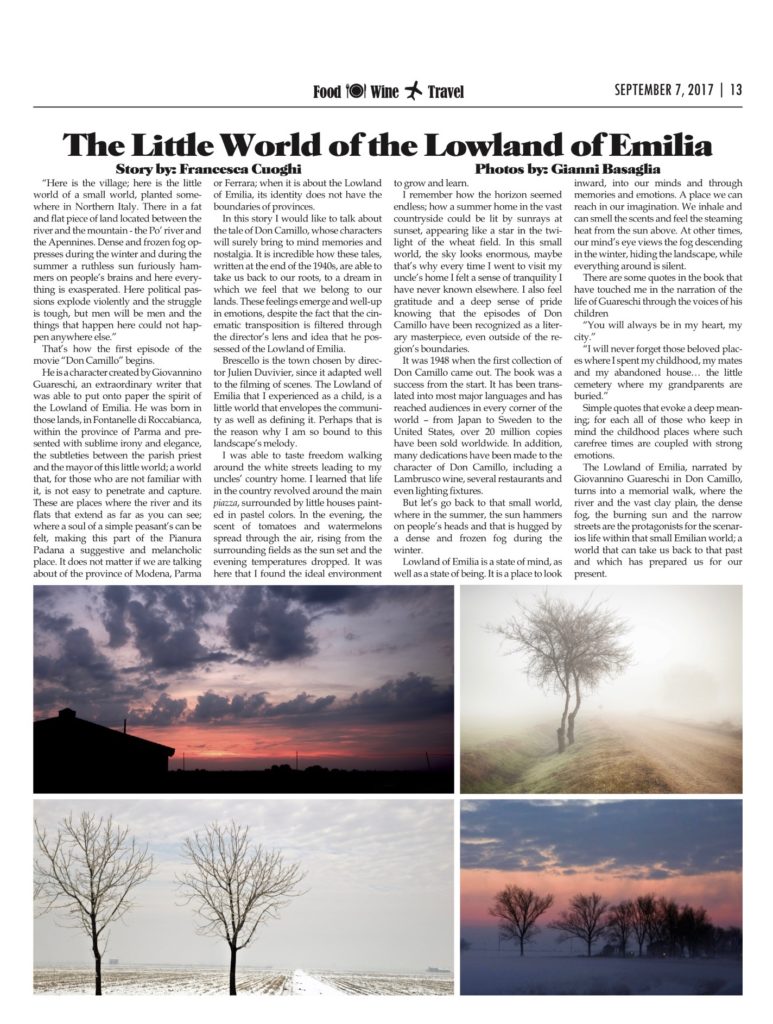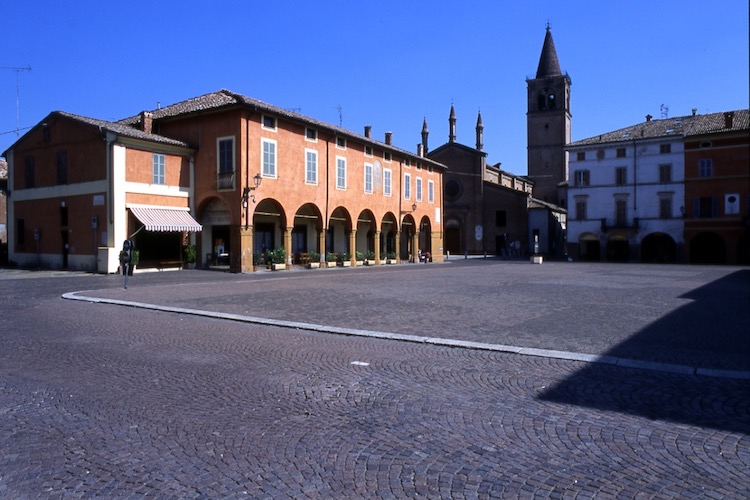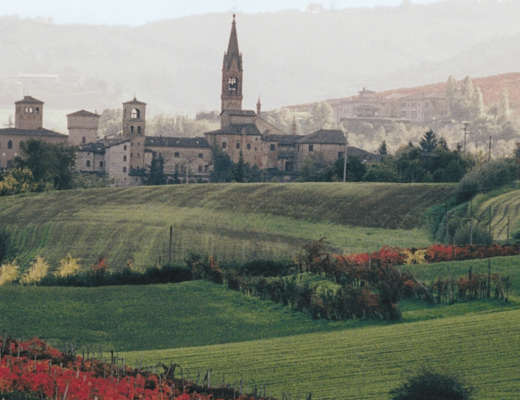“Here is the village, here is the little world of a small world planted somewhere in Northern Italy.
There, in a fat and flat piece of land located in between the river and the mountain, the Po’ river and the Apennines.
Dense and frozen fog oppresses during the winter, and during the summer a ruthless sun furiously hammers on people’s brains and here everything is exasperated. Here political passions explode violently and the struggle is tough, but men will be men and the things that happen here could not happen anywhere else”.
That’s how the first episode of the movie Don Camillo starts.
A character created by the pen of Giovannino Guareschi, an extraordinary writer that was able to put on paper the spirit of the Lowland of Emilia. He was born in those lands, in Fontanelle di Roccabianca (in the Province of Parma), and he has represented, with sublime irony and elegance, the subtleties between the parish priest and the mayor of this tiny world.
A world that, for those who are not familiar with it, is not easy to penetrate and capture.
Those are places where the water, the river, the flats that extend as far as you can see, represent the protagonists of a peasant soul that makes this part of the Pianura Padana a suggestive and melancholic place. It does not matter if we are talking about of the province of Modena, Parma or Ferrara, when it’s about the Lowland of Emilia, because its identity doesn’t have boundaries of Provinces.
In this story I would like to talk about the tale of Don Camillo, for those of you who see in those characters memories and nostalgia accumulated in their minds, just like I do.
It is incredible how these tales, written at the end of the 40s, are able to take us back to our roots, to a dream through which we feel, each time, the belonging to our lands.
Feelings that come out and give us emotions, episode after episode, despite the fact that the cinematic transposition is filtered by the idea that the director had of the Lowland of Emilia. Brescello is the town chosen by Julien Duvivier, since it adapted well to the filming scenes.
In fact the Lowland of Emilia is a little world that encloses the characteristics of a community that, in my case, I was able to enjoy and experience since I was a child, and maybe that’s the reason why I am so bounded to this landscape melody.
I was able to taste freedom walking around the white streets by my uncles’ country home, learning that life in the country revolved around the main piazza, surrounded by little houses painted in pastel colors, while in the evening, from the surrounding fields, the scent of tomatoes and watermelons spread around and found its ideal environment here.
I remember how the horizon was endless and how a summer home in the vast country side could be lit by sun rays at sunset, and look like a star in the twilight of the wheat field.
Here the sky looks enormous, maybe that’s why every time I went to visit my uncles I felt such a sense of tranquility I have never felt anywhere else. I also feel gratitude and a deep pride in knowing that the episodes of Don Camillo have become a literary masterpiece even outside of the national boundaries.
It was 1948 when the first collection with the title of Don Camillo came out and the book had a lot of success from the start. It has been translated into the main languages and more. In fact, it has reached also the most unusual states like Japan, Lebanon, Greece, Turkey, Sweden, Ukraine and the United States. It has also been translated in Bulgarian, Russian, Ukrainian and Vietnamese for the broadcasts on the radio for the BBC.
Over 20 million copies have been sold worldwide, together with many dedications made to the character of Don Camillo, like a Lambrusco wine and a woman overcoat.
But let’s go back to that small world, where in the summer, the sun hammers on people’s heads and that is hugged by a dense and frozen fog during the winter. Lowland of Emilia is just like a place we look for in our minds through memories and emotions, which we can reach every time with our imagination. We can smell the scents, feel the steaming hot and the fog that descends in the winter hiding the landscape, while everything around is silent.
There are some quotes that touched me in a particular way in the book that narrates the life of Guareschi through the voices of his children: “you will always be in my heart, my city”.
“I will never forget those beloved places where I spent my childhood, my mates, my abandoned house (…) the little cemetery where my grandparents are buried (…)”
Simple quotes that encloses a deep meaning for each of us who keeps in his minds the childhood places, those of carefree and strong emotions.
The Lowland of Emilia, narrated by Giovannino Guareschi in Don Camillo, turns into a memorial walk, where the details and nuances of a territory where the river (no matter which one it is), the vast clay plain, the dense fog, the burning sun, the streets narrowed by the banks, are the protagonists of the life scenarios of that small Emilian world that will take us back in that past that has prepared us for our present.






